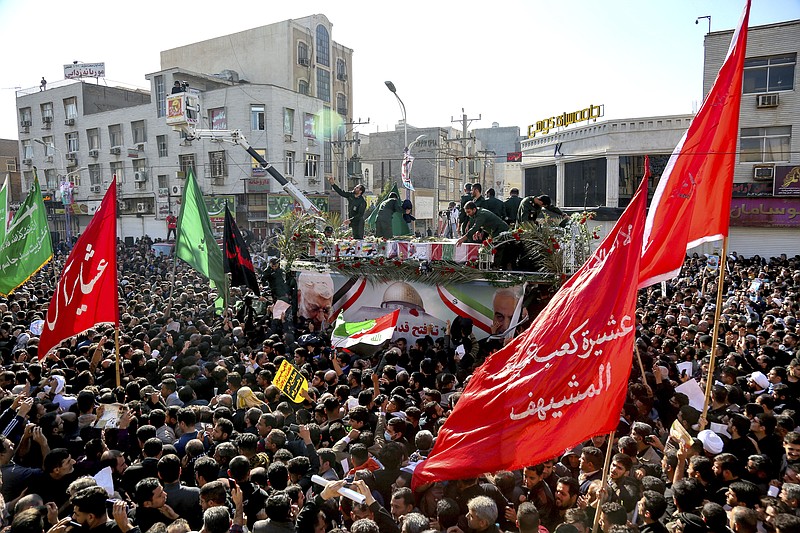Is it any wonder that too many Americans don't know what to believe anymore?
Our president changes his story about any given event from one day to the next - sometimes from one hour to the next. And many of his henchmen do the same.
Take for example the reasoning for why Donald Trump ordered the drone strike that killed Iranian Maj. Gen. Qassem Soleimani in Iraq on Jan. 3.
The Trump administration first claimed the action was taken to disrupt an "imminent" attack on U.S. personnel but refused to release any intelligence to back up the claim. (Mind you, almost no one quibbled with the idea that Soleimani was a bad guy whom no one would miss. But plenty of people felt that such an action, sure to bring unsettling consequences, deserved a more informed approach - at least some bipartisan congressional notification. Better still, congressional consideration and approval.)
But after lawmakers expressed skepticism based on the briefings they received (one Republican publicly called it "the worst briefing he'd ever seen on a military issue), Trump tweaked his story and ramped up the theatrics.
On Jan. 9, our president claimed Soleimani was about to bomb the U.S. Embassy in Baghdad. Then he claimed to Fox News that Soleimani was about to bomb four U.S. embassies.
Trump wasn't alone in spinning story changes. On Jan. 3, Secretary of State Mike Pompeo said the "decision to eliminate Soleimani" was "in response to imminent threats to American lives." Two days later, Pompeo played down the importance of an "imminent attack" in the decision to kill Soleimani, telling "Meet the Press:" "It's never one thing. ... It's a collective. It's a full situational awareness of risk and analysis." Later still, Pompeo told Fox News, "There were a series of imminent attacks that were being plotted by Qassem Soleimani. We don't know precisely when and we don't know precisely where."
Imminent. But we don't know when. Or where. And we killed the planner, so now we still don't know.
Do we think that killed the plan, too? Do we think that killed the malign hate among Soleimani's supporters that drives other plans of attack?
But we digress.
Meanwhile, according to The Washington Post, "a senior administration official and a senior defense official" told Post reporters they "were only aware of vague intelligence about a plot against the embassy in Baghdad and that the information did not suggest a fully formed plot." Neither official said there were threats against multiple embassies.
Then on Sunday, Defense Secretary Mark T. Esper on CBS's "Face the Nation" appeared to contradict his boss, the president. Esper said he never saw any specific piece of evidence that Iran was planning an attack on four American embassies.
"I didn't see one with regard to four embassies. I share the president's view that probably - my expectation was they were going to go after our embassies."
Then in a different interview, one with CNN, Esper declined to answer the same question, saying he was "not going to discuss intelligence matters" on the show. Instead Esper said: "What the President said was he believed it probably could have been. He didn't cite intelligence."
"Probably could have been." Let that sink in.
Is this serious? We're basing assassinations on leaders we don't like in countries we are not at war with on the president saying he believed something probably could have been? Are we basing attacks that have war consequences on the flawed thought processes of a president we know has lied or misrepresented the truth at least 15,413 times over 1,055 days, according to The Post fact checker?
It's worth noting that in Esper's "Face the Nation" comment - the one in which he said he didn't "see" any specific piece of evidence that Iran was planning an attack, let alone an imminent one - marked the second time in a week that the Pentagon contradicted Trump on Iran.
The first came after the president Trump threatened to target Iranian cultural sites if Tehran attacked the United States. Esper later said the U.S. military would follow international laws - which make targeting cultural sites a war crime.
The sad consequence is that we likely won't know for years the full impact of this latest Trump deceit - neither in Iran where protests still rock the streets, nor in our own country or even globally.
To borrow a phrase from the president via Secretary Esper: "It probably could have been" a feckless and reckless desperate attempt to distract the country from an impending impeachment trial.
Or it probably could have been just another egregious example of the morally bankrupt set of leaders we have in our once-proud, now-tarnished White House.
